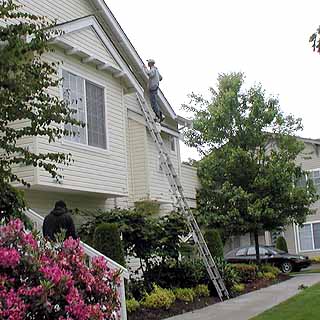
Surveys
Awards
DJC.COM
March 23, 2006
It only takes a minute — to get hurt
Apex Construction Safety

Photo courtesy Apex Construction Safety
This worker has left his ladder and could fall from the narrow ledge.
|
John looked at his watch and let out a sigh. Only 10 more minutes and the workweek would be over. This was the weekend he had been waiting for. Tonight after work John was taking his 6-year-old son fishing for his first time. It was going to be great, quality time, just father and son. One last task and he could put his tools away.
As John climbed the ladder to the second-story balcony, he noticed that the ladder wobbled a bit. He knew that it was only going to take a minute to measure the last piece of trim. If he climbed down, got the proper ladder and positioned it on stable ground it would take 30 minutes. Why turn a one-minute job into a 30-minute job? That would also mean more overtime and he had been told that no more overtime was approved. He had climbed ladders often for the last eight years. It would only take a minute anyway.
A life-long decision
When John's feet stepped onto the 16th rung of the ladder he stopped, reached out and extended his tape measure. He had to lean a little to place the end of the tape against the wall. Just as the tape touched the wall, the ladder slid to the left. With nothing to hold onto, John fell to the concrete sidewalk.
Coworkers gathered around, but didn't know what to do to help John. He could not move his legs and passed out due to the extreme pain. An ambulance was called to the scene. Doctors later found that John's spine was broken, he had fractured his left femur and had suffered a massive concussion.
This final task was only going to take one minute! How long did the accident take? Less than a minute! Gravity pulls at 32.2 feet per second. That means John fell 16.1 feet in one second. He could not even change his position before he hit the concrete.
John will not be going fishing after work with his son. Even worse, he will never walk again. The job that was only going to take one minute will now last the rest of his life. His decision to not get the right ladder and position it on stable ground will not only have a damaging impact on John, but also on his family and employer.
Accident investigations often reveal that the injured employee felt that the job would only take a minute. They risked their life and health to save time; and as we know time is money.
Would your boss be happy if you took a risk to save a few dollars? Ask him, "Hey boss, if I can save you $50 by doing something unsafe, do you want me to do it?" If he answers, "yes," you might think of looking for a new job.
The $144K back injury
Accident investigations often reveal the fact that the job was almost done when the injury occurred. Comments I regularly hear when conducting an investigation are: it was the last wall we were painting; it was the last truckload; it was the last piece of pipe; it was the last shingle. Workers tend to try a little harder at the end to finish the job. They want the job completed and often compromise their safety to get that last little bit.
I delivered a presentation at the Governor's Safety Conference titled "The Economics of Safety." It showed a back injury would cost the employer an average of $144,000. If your company makes a 10 percent profit, you would have to perform $1.4 million worth of work to cover one back injury.
The most important influence you can have on the safety of your coworkers is to teach them to perform every job safely. Let them know that even if it is only going to take a minute, they must take the time to do it right and do it safe. Never work unsafely, not even for one minute. Most accident takes less than a minute.
Kurt Stranne, P.E., is a certified safety professional and owner of Apex Construction Safety. He is an authorized OSHA construction and general industry outreach instructor.
Other Stories:
- A bright outlook for local construction
- Scoccolo case could hurt contractors, taxpayers
- See through walls to find water leaks
- How much do you know about forklift safety?
- Are you communicating clearly? Your bottom line is at stake
- Sound Transit digs a cutting-edge tunnel
- Need a tower crane? Take a number
- Get a handle on escalating costs
- Joint ventures are like marriages — know your partner
- Engineered lumber makers step it up
Copyright ©2009 Seattle Daily Journal and DJC.COM.
Comments? Questions? Contact us.